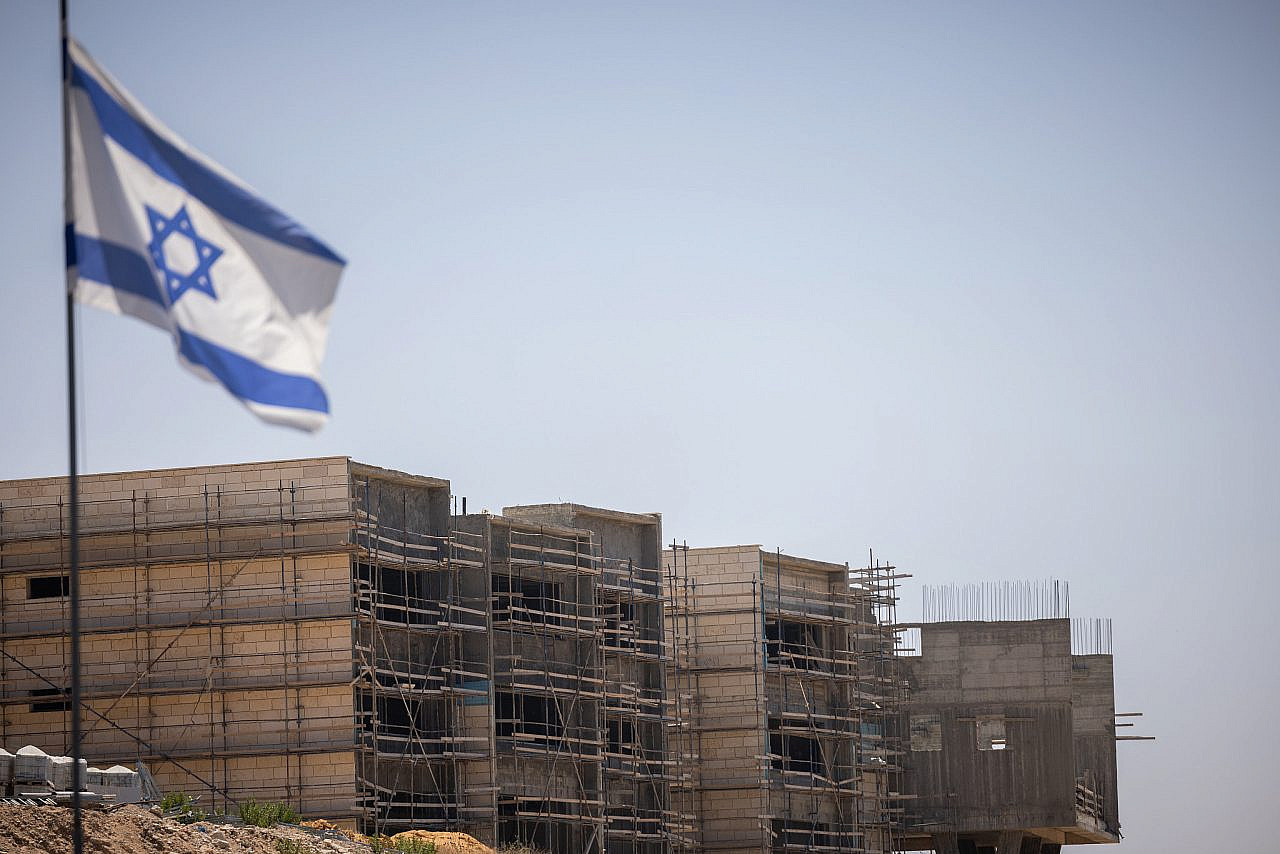Bezalel Smotrich is a polished political strategist who knew how to avoid the mistake made by his coalition colleague, Justice Minister Yariv Levin. Unlike Levin, Smotrich, who is both Israel’s finance minister and head of the Defense Ministry’s new Settlements Administration — which grants him enforcement powers over Palestinian construction, settlement planning, and land allocation in the West Bank — did not call a press conference to announce a massive judicial overhaul that has faced widespread resistance by large swathes of the Israeli public.
Nor did he proclaim, in his most militant tone, that he would be crushing Israeli democracy. Smotrich seems to understand that effective action, particularly when it comes to the settlement enterprise, is done quietly and behind the scenes.
Last Wednesday, during a discussion in the Foreign Affairs and Defense Committee, he unveiled his annexing revolution in the occupied West Bank. As he was doing this, his friend, MK Simcha Rothman, was leading a tempestuous and highly-publicized discussion in the Constitution Committee on the controversial reasonableness clause, just a few days before it passed in the Knesset.
The discussion in the Foreign Affairs and Defense Committee was held under the title “The Palestinian Authority’s Takeover of Open Areas.” At the beginning of the meeting, the representative of the Civil Administration — the military body charged with overseeing the lives of civilians living in the occupied territory — provided data showing that Palestinians have no way to legally build in Area C of the West Bank, which covers over 60 percent of the West Bank and is under full Israeli military control. Around 98 percent of Palestinian requests for building permits are rejected, said the representative.

This, in and of itself, is nothing new; similar discussions have been held in the Knesset for the last five years. Yet there was a key difference in the latest debate. The terminology of settler organizations and the extreme right, who work tirelessly to get decision makers to embrace their ideology and policies, were a feature at most of the previous discussions. But now the representatives of these organizations, including Smotrich, are the ones running the government, and their ideology has turned into state policy.
The first harbinger of change was the presentation by the man leading the discussion, MK Avihai Boaron, who represents the settlement movement in Likud. Boaron’s presentation dealt with Palestinian construction in a few open areas in Areas A and B [the former is supposed to be under full control of the Palestinian Authority, while the latter is split between the PA and the Israeli military], which, according to him, harms the settlement enterprise by interrupting territorial contiguity and preventing expansion. Following Boaron’s opening remarks, the committee turned into a stage on which Smotrich could lay out his revolution.
Smotrich takes issue with the fact that Israeli citizens living in the occupied territories are under the sovereignty of the military commander and not an Israeli civilian body. By its very nature, the army, Smotrich told the committee, is preoccupied with matters of security. And while security is important, the minister clarified, half a million Jewish Israelis with civil needs live in the West Bank and thus are entitled not only to have the government manage their lives, but to have their civil considerations not play second fiddle to security considerations.
Moreover, the military bureaucracy is convoluted, he added, and the services that the Civil Administration provides to the settlers are cumbersome and slow. This is precisely where his Settlements Administration, which was created under the current government as part of the Defense Ministry, comes in — to transfer responsibility over the occupied territory from the military to civilian hands, in complete contravention of international law.

In his eyes, Smotrich declared a revolution that celebrates democracy. Practically, however, this is nothing more than a declaration of annexation. As for the millions of other residents of the West Bank — those who cannot vote or be elected to the Israeli parliament — Smotrich made clear that there is nothing to be worried about. The minister clarified that annexation will not apply only to Area C, and that “construction enforcement” — meaning the demolition of Palestinian structures — will also take place in Areas A and B. Although Palestinian construction is completely legal in those areas, according to the Oslo Accords (and where the Civil Administration does not have the power to pass master plans), it will still be possible to justify Israeli building enforcement in other ways should Smotrich get his way.
Israel already demolishes Palestinian homes in Areas A and B for “security reasons.” In the last decade, the general of the IDF Central Command, who, according to international law, is the sovereign in the West Bank, has issued orders forbidding construction near roads used by settlers or in other areas that could endanger them. Thus, the key to dealing with the Palestinian Authority’s “takeover” of its own territory is found in the way Israel defines “security considerations.”
That definition, according to Smotrich, should also encapsulate “national security,” which is why it would be possible to include such considerations in future plans, such as the preservation of land reserves for settlement territorial continuity and expansion. According to Smotrich’s proposal, PA activities will be defined as “hostile,” which will allow for the Israeli authorities to confiscate its funds and impose additional sanctions.
Thus, when the public’s attention was focused on Rothman’s judicial revolution just two meeting rooms away, Smotrich announced his plan to annex the entire West Bank without granting civil status to the Palestinian residents in the area, as well as the cancellation of key parts of the Oslo Accords. This revolution will not be anchored in law. It will be submitted to the cabinet in about a month, after which it will be approved by the defense minister and the prime minister, the latter of which, according to Smotrich, is very involved in and committed to it.
Smotrich made sure to utter two sentences meant to calm the critics. The first was that “there is no change in the legal status of the territory,” and the second was that “we are committed to the Oslo Accords.” This was little more than lip service to try and assuage the international community, hide his sleight of hand, and protect Israel from the diplomatic price it would have to pay for annexation.

The world knows that military occupation is bad. Foreign military rule over enemy territory is undesirable, which is why belligerent occupation is legally considered a temporary situation. Annexation, on the other hand, is illegal, which is precisely why the occupier cannot extend sovereignty over the territory, but instead holds onto it in a trusteeship. Years of bloody wars and expulsion of civilians by occupying armies of countries led the international community to agree that the occupying power is not allowed to use the resources of the occupied territory for its needs, nor transfer a civilian population to live in areas under occupation. In order to avoid real estate incentives for wars, the only things the general of the occupying army can take into consideration are the interests of the occupied population, which are protected by law, and the army’s immediate security concerns vis-à-vis the occupied territory.
But under the current Israeli government, narrow security considerations have become national ones, and are expressed in the form of massive master plans. The entirety of the West Bank is managed solely for the benefit of the Jewish citizens of the occupying power. To maintain the appearance that nothing has changed, and since, according to Smotrich, there has been no change in the legal status of the territory, the general of the IDF Central Command will be the one to sign the orders.
Most read on +972
Thus, the government, which claims its judicial overhaul is being carried out in the name of “equal citizenship” and “democracy,” is working to expand its control by military force over 3 million Palestinians who lack the right to vote, to grossly violate international law, and to dismantle the Oslo Accords in all but name.
The creeping annexation of the West Bank has been taking place for years. Israel’s policy of control over the occupied territories is based on systematic discrimination, exclusion, and plunder. Any semblance of the occupation’s “temporary” nature has disappeared. The international community, led by the United States, has so far been content to publish weak statements in response to the changes on the ground, and continues to recite empty platitudes about the two-state solution and its commitment to peace. Now, Smotrich’s revolution tears the mask off of Israel’s veneer of legality and so-called rule of law. Israel’s elected officials claim that this is how democracy works — you get what you vote for. Indeed, we will all pay the price for this new regime, and as always, the main victims will be the Palestinians.
This article was first published in Hebrew on Ynet. Read it here.




